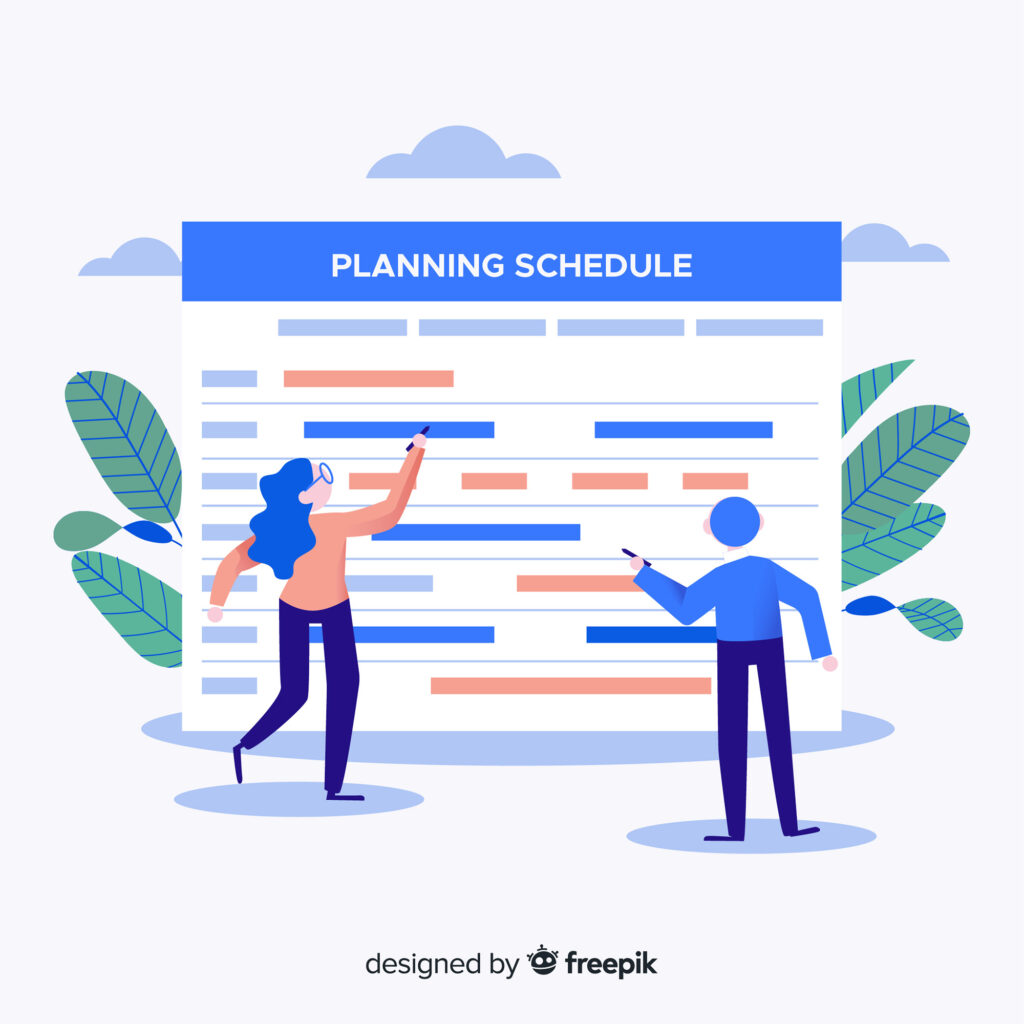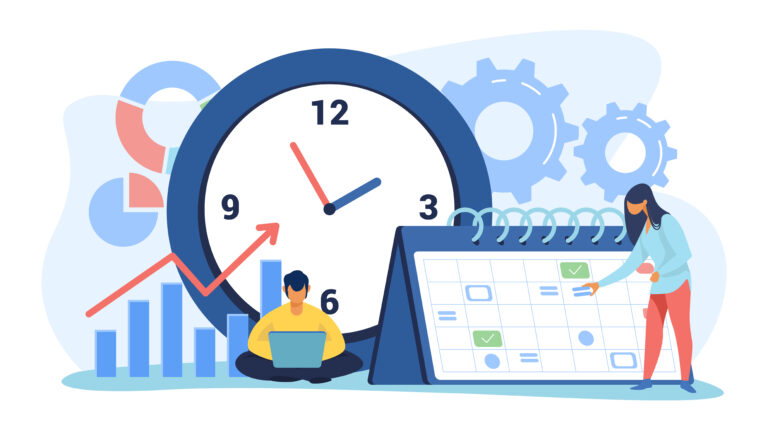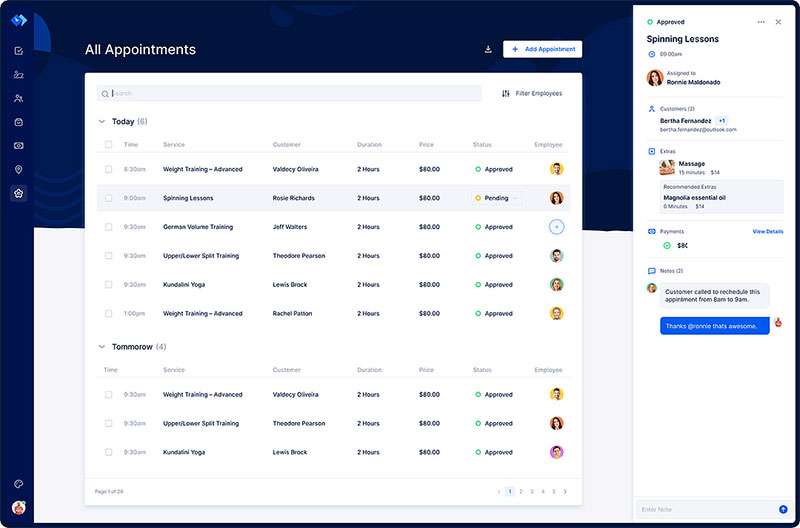Time management skills have become essential and are one of the determining factors when it comes to business success. Effective scheduling is the key to optimizing your productivity and achieving a better work-life balance. No matter in which industry you operate, organizing your schedule is essential for success.
We’ll explore the importance of scheduling, and different types of schedules and equip you with actionable tips for effective scheduling to help you make the most out of your time. Both while working and relaxing.
Ready? Let’s dive deeper.
What is an Effective Schedule?
Effective scheduling is the process of planning and structuring your activities, appointments, tasks, and other commitments in a way that maximizes productivity and minimizes stress. It involves creating a well-organized schedule that ensures you have enough time for essential responsibilities, while also maintaining work-life balance, and having enough time to devote to personal growth and relaxation. The goal of effective scheduling is to strike a balance between productivity and downtime, which minimizes the chance of burnout and enables you to achieve your goals without feeling overwhelmed.
Why is Scheduling Important?
Effective scheduling separates successful people from those who always need an extra day to pursue their goals. We all have the same 24 hours in a day, and an organized schedule will help you make the most out of your day.
Scheduling plays a vital role in time management. When you allocate specific time slots for different tasks and group appointment types based on priorities and similarities, you’ll avoid the effects of poor time management in your business. Effective scheduling will help you to remain focused and avoid wasting time on unproductive activities.
You’ll also be able to set clear business goals and KPIs and create a clear roadmap to achieve them. Breaking down larger tasks into smaller, manageable chunks, makes it easier to progress steadily toward your goals. When you have a clear roadmap and organized schedule, you’ll experience less stress and maintain a healthy work-life balance. Scheduling allows you to have enough time to devote to personal activities and leisure and stay in control of your time.
Types of Schedules
There are different types of schedules, and when organized effectively, you’ll have a comprehensive solution to increase your productivity. While we mainly focus on organizing work and employee schedules, we also take into consideration other activities you need to take care of. Let’s see how all these types of schedules will help you manage your time more effectively.
Daily schedule
The daily schedule is a detailed plan that outlines all your activities for a single day. You’ll stay focused and on track throughout the day and always know what’s next on the agenda. Organizing a daily schedule includes multiple steps. If you have daily repeating tasks, use them as a starting point in creating your daily schedule.
The next step you should take is to categorize all daily tasks into categories, such as work, personal or family commitments. Once you have all these, it’s time to prioritize the tasks based on their urgency. Set realistic goals for your daily schedule and avoid overloading it.
P.S. While having a structure for your daily schedule, you’ll probably have to update it on the go and leave some room for unforeseen changes.
Weekly schedule

Image by Freepik
The weekly schedule provides an overview of your responsibilities for an entire week. You’ll have recurring commitments, such as work, classes, gym, and work. But also enough time to devote to other tasks that don’t have a fixed deadline. Organizing a weekly schedule consists of having a structured daily schedule. Mainly all the tips for daily schedule apply to weekly as well, it just provides a bigger picture and allows you to find time for urgent tasks.
Monthly schedule
Your monthly schedule gives you control over your entire month as it outlines major monthly events, recurring appointments, and deadlines. Organizing a monthly schedule effectively helps you plan and prepare for every task well in advance. If your business requires it, you can also create monthly schedules for the whole year and include every major event to always be prepared for what’s coming next.
Block schedule
Block schedule refers to a type of scheduling process that involves dividing your day into larger time blocks, each dedicated to specific tasks. For example, mornings could be for creative work, you can block out the afternoon for appointments, and use evenings for unwinding. Block scheduling is especially useful for resource utilization, especially focus because it keeps your mind on 100% for specific tasks.
Project-based schedule
When you work on a specific project, breaking it down into phases and smaller tasks is useful. That’s what project-based scheduling is all about! By breaking down the project into smaller tasks, you’ll be able to allocate enough time and resources for each phase and stay on track.
Effective Scheduling Tips
To help you organize your schedule effectively and make the most out of your time, we’ve prepared powerful & proven effective scheduling tips you can implement right away.
Prioritize tasks
Identify the most important tasks and prioritize them based on urgency and significance. Techniques like a time management matrix can help you categorize your tasks into four quadrants based on their urgency and importance. This will help you focus on what truly matters. Urgent-Important matrix is a valuable tool that will help you distinguish between tasks that demand immediate attention and those that are important, but not urgent.
Set realistic goals
Be realistic about what you can accomplish in a certain time frame. Don’t overload your schedule with too many tasks, as this leads to stress and burnout which reduces your productivity. If you want a healthy and sustainable schedule, realistic goals are paramount. Consider factors such as working speed, external commitments, and potential interruptions when organizing your schedule. Adjusting expectations and deadlines accordingly is necessary, and it’s always better to under-promise and over-deliver.
Allocate buffer time
Leaving some buffer time between appointments and tasks to account for unexpected delays or simply relax will help you stay on track and provide high-quality services all the time. Don’t let a single unexpected delay throw off your entire schedule. Having buffer time will reduce stress and allow you to have enough flexibility in your schedule without compromising productivity.
Learn when to say no
As service providers, we’re taught it’s necessary to be helpful and accommodating all the time. But that doesn’t work in the long run. You have to learn to say no to tasks and appointments that can disrupt your well-organized schedule and hinder your productivity. Politely declining tasks is better than underperforming and overwhelming yourself with more work than you can handle.
Plan your day ahead
The evening is a perfect time to plan for tomorrow. While you probably already have appointments and tasks on your daily schedule, take a few minutes to get familiar with them and add other commitments.
Use a simple to-do list
You don’t need a super complex schedule to make it all work. A simple to-do list can get you a long way when it comes to keeping track of your tasks and staying on top of things. Writing down all the tasks and checking them off the list once you finish will give you a sense of accomplishment and a boost in motivation to stick to your schedule.
Utilize the type of schedule that works for you
We’ve mentioned different types of schedules and you don’t have to use all of them! Experiment and find out what works in your specific case.
Consider your energy levels during the day
Morning person or a night owl? Identifying the times of day when you’re most productive and energetic will help you achieve more in less time. Schedule important or challenging appointments during peak performance times to make sure you’re 100% focused.
Set realistic time estimates
Do you underestimate or overestimate yourself when it comes to organizing a schedule? The key is to be realistic about how long each task will take to complete. Of course, maybe you won’t get it on the first try, but learn as you go.
Eliminate time wasters and distractions
Even if you don’t have problems with focus and concentration, eliminating distractions and time wasters will help you stick to your schedule. Identify activities that consume a significant amount of your time without contributing much value. Free up more time for what really matters!
Learn to delegate
You don’t have to do it all yourself, do you? Delegate tasks to others that can handle them and reduce your workload. As a business owner, it’s important to work on your business and focus on tasks that only you can do.
Batch similar tasks together
If you have repetitive tasks or similar tasks, it’s a good idea to batch them together. It will save you time and mental effort, while giving you that sense of accomplishment you deserve when you check them off your schedule for the day.
Be flexible and disciplined
While it’s important to organize and stick to your schedule, you still have to be flexible to accommodate unexpected changes. Don’t let small disruptions derail your day.
Use technology to your advantage
Embrace scheduling tools and apps that can help you automate repetitive tasks and streamline processes in your business. Calendar apps, task managers, and reminders are incredibly useful in keeping your schedule organized and on point.
Effective scheduling isn’t about filling every minute of your day with tasks, but about finding the right balance that allows you to be productive, achieve your goals, and take care of yourself. A well-structured and organized schedule will set you up for success and allow you to flourish in both your personal and professional life.
How to Organize Schedule Effectively Step-By-Step

Image by Freepik
But where do you start? We’ve created a step-by-step guide to teach you how to organize your schedule effectively.
1. Analyze what type of business you run and its needs for flexibility
How flexible or strict your schedule needs to be depends on your business and its needs. Do you have a lot of unforeseen circumstances that can mess up your schedule? Or does everything usually go as planned? Depending on your unique circumstances, you should make your schedule with as much flexibility in mind as you need.
2. List repeating tasks
Listing repeating tasks when organizing your schedule will give you a sense of accomplishment and clarity you need to complete everything. Take some time to brainstorm and write down tasks that repeat daily weekly or monthly basis.
3. List other tasks
Now it’s time to write every other task you need to complete and gain a comprehensive overview of your responsibilities. When organizing your schedule, list work-related tasks, personal errands, and also what you do to relax. You’ll prevent forgetting about essential commitments and ensure that nothing falls through the cracks.
4. Categorize tasks
Now it’s time to categorize tasks into different groups based on their nature or context. You’ll approach them more systematically and efficiently and ensure neither personal nor professional life suffers. Common categories are work-related appointments, chores, personal growth, health and fitness, social life, and family life. You can go a step further and also group similar tasks in each category in subcategories to give you even more clarity and a better system.
5. Set priorities
Go over each task on your list and set priorities. Assess the urgency and importance of each task in different categories and determine which ones require immediate attention. Make sure to tackle tasks from each category and use the “Urgent-Important” scheduling tip we mentioned earlier.
6. Create a daily schedule
To have an organized schedule, it’s important to create a daily schedule for each day in advance. Block out specific time slots for each task and take into account their priority and your energy levels. It’s important to be realistic with your time estimates and make sure you don’t have too much on your plate. After each completed daily schedule, you’ll feel a sense of accomplishment to give you a motivation boost for what’s yet to come.
7. Set up reminders
Setting up reminders is crucial if you don’t want to forget about something important. They’ll help you stay on track and make sure you utilize your schedule effectively.
8. Analyze and adjust
Regularly reviewing your schedule will help you assess its effectiveness and adjust it to improve productivity and achieve even better results. It’s okay if you don’t get it on the first try, but it’s important to learn from your mistakes. Analayzing your schedule will help you make better scheduling decisions and after some time the need for adjusting will be lower.
Keep Your Schedule Organized with Trafft
Effective scheduling is a skill you can learn and it will significantly enhance your productivity, boost your revenue, and improve the overall quality of your life. By understanding different approaches to organizing your schedule and following the actionable advice we’ve provided, you’ll take control of your time and achieve your goals more efficiently.
And a little bit help of from technology can get you a long way and make you realize an organized schedule isn’t as unrealistic as you thought. Trafft will help you take full control of your appointments, monitor important business metrics, set up reminders, and automate repetitive tasks. With its powerful scheduling hacks and features like:
Calendar integration
Trafft integrates with Google, iCal, and Outlook calendars for a perfectly organized schedule. It’s easy to sync appointments – all in one place. With Trafft, you’ll never miss an important appointment or double-book yourself.
Automated reminders
Besides avoiding no-show appointments, reminders will also help YOU and your employees have an organized schedule. By setting up automated appointment reminders on your preferred channel, everyone concerned will get a notification and important information about upcoming appointments.
Time zone management
If you work with clients all over the world, don’t worry about time zone differences when scheduling. Neither you nor your clients will be confused, as Trafft handles scheduling in different time zones seamlessly.
Online booking
Clients can find available spots in one glance and book appointments online in just a few clicks. Better yet, they can also pay directly through your booking page because of awesome integrations with popular payment gateways.
Insightful business dashboard
You’ll get valuable insights into your scheduling efficiency and productivity. When you have the data, you can analyze it to find areas for improvement and see whether your schedule needs a revision. Your schedule will be as organized as it gets!
And we’ve got something even better than a free trial. You can use Trafft for free if you need less than 5 members, and try it out as long as you want before you commit to paid plans.
Sounds fair? Sign up for free now.




